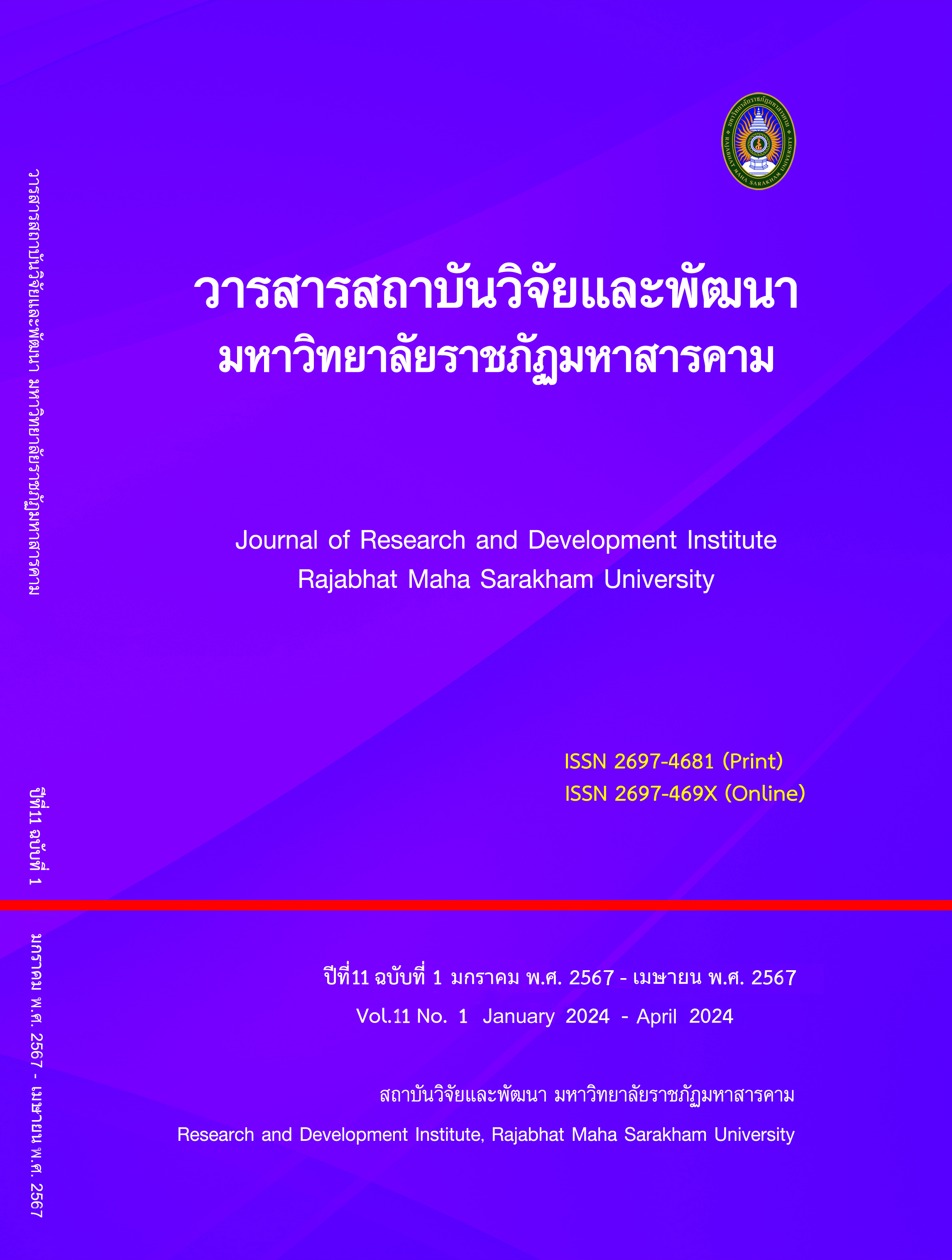The study of behavior and problems of household accounting of the sufficiency economy philosophy of agriculturist In ThaTum Sub-District, Mueang District, Maha Sarakham Province
Keywords:
Problems of household accounting, Reducing debt problems, Sufficiency economy philosophyAbstract
This research aimed 1) To study the behavior of problems of household accounting of the sufficiency economy philosophy, 2) to solving debt problem for agriculturists in 3 aspects, personal, understanding potential problems and obstructions.
and 3) to compare the differences from gender, age, education levels, monthly incomes people in family expenses, amount of debts, source of debt.
The research samples were 186 shops agriculturists in ThaTumSub-District Mueang district, Mahasarakham province. by using a purposive sampling technique. To achieve the objectives, the data obtained by questionnaires were analyzed by using descriptive statistics, that is, arithmetic means, and standard deviation, t-test and F-test.
The study results revealed that opinions of the agriculturalists toward the factors affecting the preparation of household accounting overall were at moderate level. On each aspect, personal aspect was at high level, whereas, understanding potential, as well as problems and obstacles were found at the moderate level. The agriculturalists with different education levels, monthly incomes, amount of debts, debt sources, and the agriculturalists with differences in gender, age, and household members had no difference in opinions toward the factors affecting the preparation of household accounts overall on the aspect of personal, understanding potential, as well as problems and obstacles.
References
Berdie, D.R., Anderson J.F., & Niebuhr MA. (1986). Questionnaires: design and use. Metuchen, N.J.: Scarecrow Press.
Bunthong, U. (2017). Study of personal qualification factors. Cognitive process factors and work process factors that affects the readiness of Thai accountants to support Digital Economy: A case study of Thai accountants in business organizations in Bangkok. Independent Study. Bangkok : Bangkok University.
Chetkhunthod, P. & Iabsirimethee, P. (2017). Factors affecting the household accounting behavior of people in Sung Noen District. Nakhon Ratchasima Province. Journal of Nakhonratchasima College (Humanities and Social Sciences). 11(1), 98-106.
Chotivechkarn, S. (2018). Utilization of Artificial Intelligence (AI) in accounting work. Federation of Accounting Professions Newsletter under Royal Patronage, 68, 12-13.
Chunhajinda, P. (2017). FinTech to become Thailand 4.0. Electronic Journal of Open and Distance Innovative Learning : e-JODIL. 7(1), 1-23
Juthanon, S. (2018). Fintech transforms the world of business, finance and investment. Bangkok : Stock Exchange of Thailand.
Niamprem, S. (2019). Household accounting according to the concept of sufficiency economy of farmers, Ban Don Bom, Mueang Kao Subdistrict, Mueang District, Khon Kaen Province. Loe : Loei Rajabhat University.
Phasuk, P. (2018). Readiness of accounting professionals in the era of Industry 4.0. Bangkok : Ramkhamhaeng University.
Phruithithada, U. (2016). Accountants in the digital age born in the reign of King Rama IX. Accounting Profession, 12 (36),69–75.
Santajak, K. & Sukwattanasinit, K. (2018). Factors of accountants in the digital age that affect the performance of government agencies in Thailand. Hatyai Academic Journal. 17(1), 17-31
Srisa-ard, B. (2013). Statistical methods for research, Volume 1. Bangkok: Suwiriyasan.
Tirasriwat, A. (2018). Digital accounting and preparation for teaching students. In the digital economy era. UTCC Academic Day National Academic Conference and Presentation No. 2. June 8, 2018 University of the Thai Chamber of Commerce.
Downloads
Published
How to Cite
Issue
Section
License
Copyright (c) 2024 ไอลัดดา โอ่งกลาง, จารุวรรณ เอกสะพัง

This work is licensed under a Creative Commons Attribution-NonCommercial-NoDerivatives 4.0 International License.
Articles that are published are copyrighted by the authors of the articles







